Case Study Analysis: Principles of Business Governance, MBS518
VerifiedAdded on 2022/10/19
|11
|1782
|430
Homework Assignment
AI Summary
This assignment analyzes two case studies related to business governance principles. The first case examines the application of the mischief, golden, and literal rules in determining whether a park can restrict bicycle entry. The second case explores contract law, focusing on implied and expressed terms, and whether a party can claim damages for stolen belongings, including third-party claims. The analysis includes relevant legal principles, case precedents, and statutory references, providing a comprehensive understanding of the legal issues involved in both scenarios. The student concludes that in the first case, Mary should be allowed to enter the park and in the second case, Yvonne will be unsuccessful in claiming her loss and third party claim is not applicable.
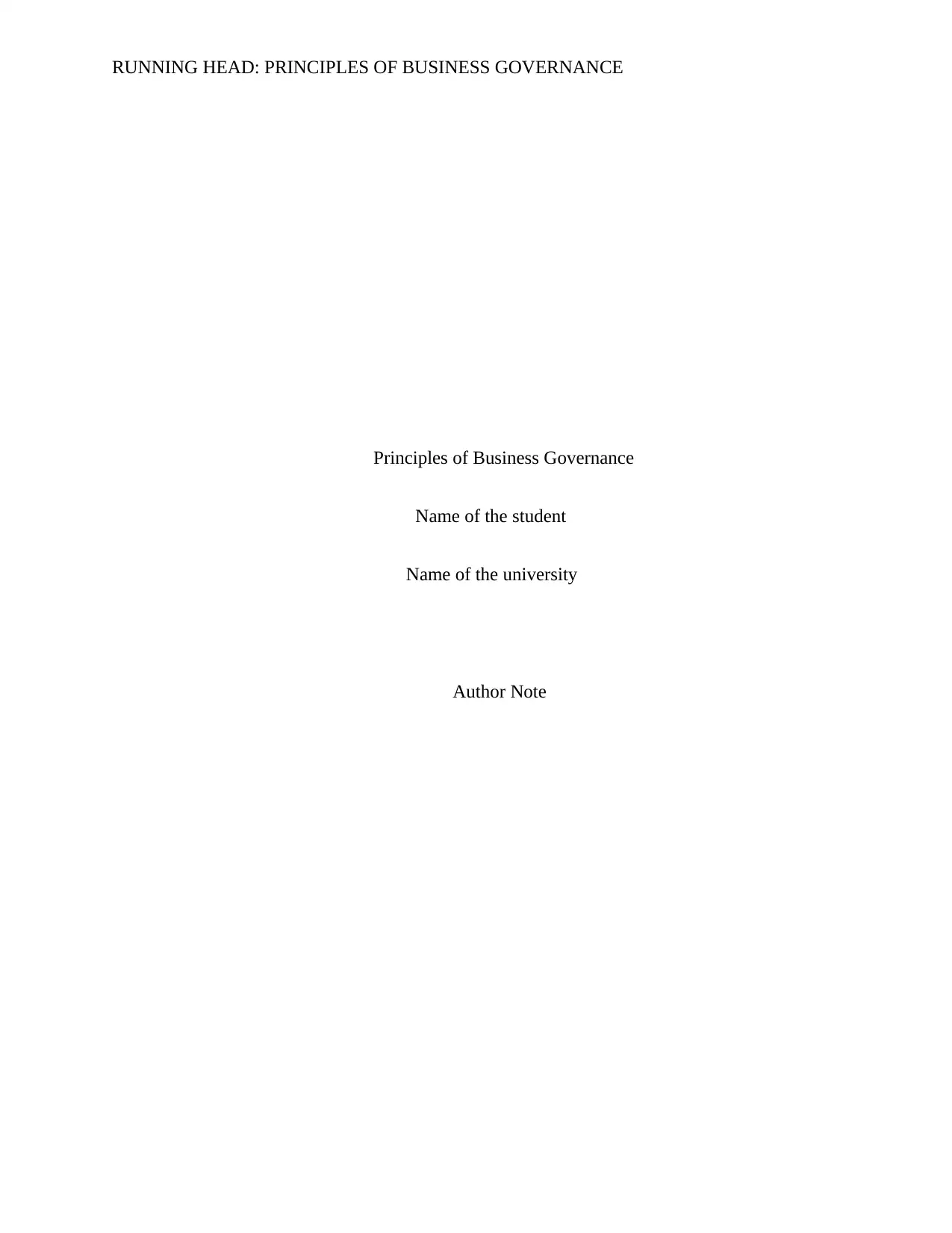
RUNNING HEAD: PRINCIPLES OF BUSINESS GOVERNANCE
Principles of Business Governance
Name of the student
Name of the university
Author Note
Principles of Business Governance
Name of the student
Name of the university
Author Note
Paraphrase This Document
Need a fresh take? Get an instant paraphrase of this document with our AI Paraphraser
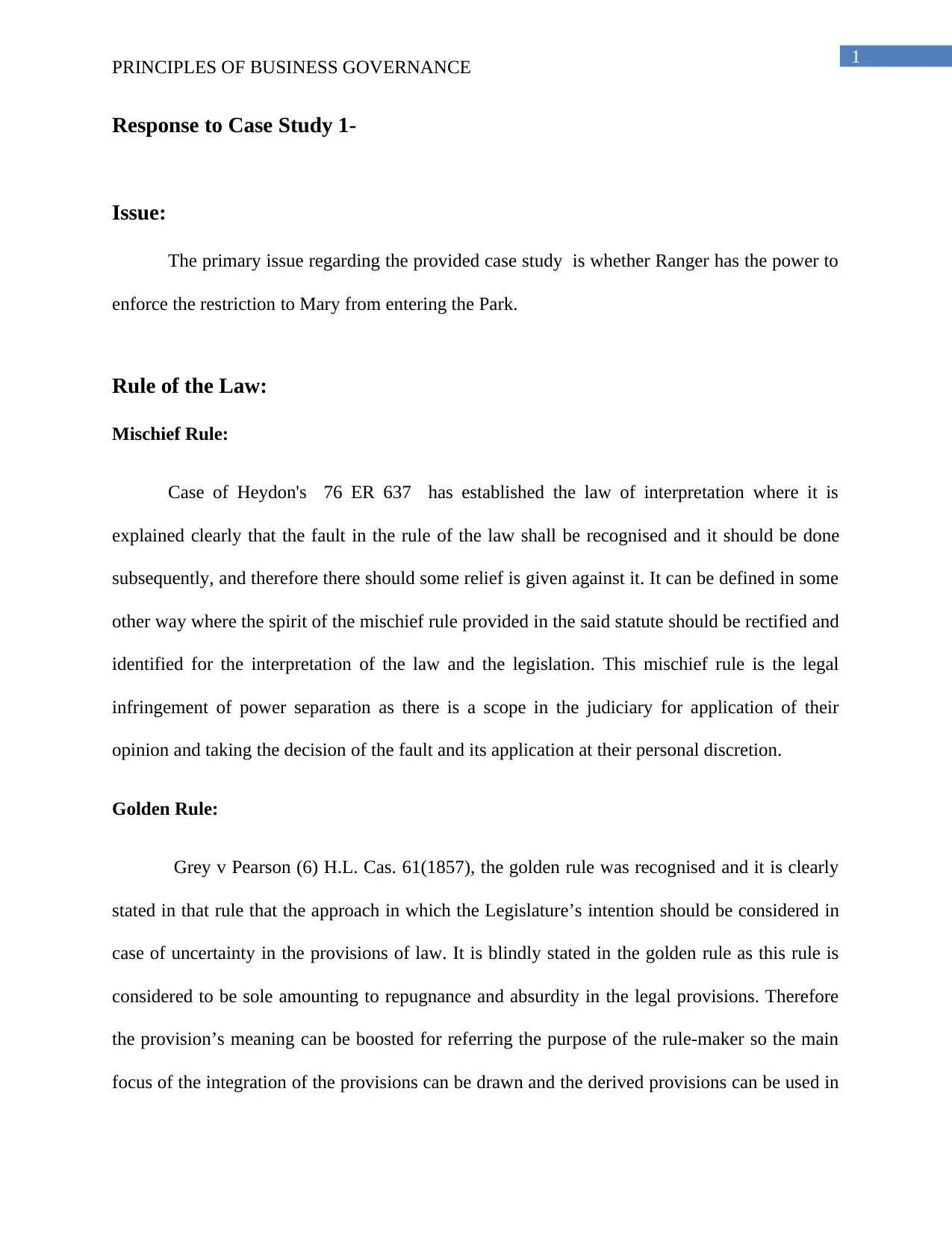
1
PRINCIPLES OF BUSINESS GOVERNANCE
Response to Case Study 1-
Issue:
The primary issue regarding the provided case study is whether Ranger has the power to
enforce the restriction to Mary from entering the Park.
Rule of the Law:
Mischief Rule:
Case of Heydon's 76 ER 637 has established the law of interpretation where it is
explained clearly that the fault in the rule of the law shall be recognised and it should be done
subsequently, and therefore there should some relief is given against it. It can be defined in some
other way where the spirit of the mischief rule provided in the said statute should be rectified and
identified for the interpretation of the law and the legislation. This mischief rule is the legal
infringement of power separation as there is a scope in the judiciary for application of their
opinion and taking the decision of the fault and its application at their personal discretion.
Golden Rule:
Grey v Pearson (6) H.L. Cas. 61(1857), the golden rule was recognised and it is clearly
stated in that rule that the approach in which the Legislature’s intention should be considered in
case of uncertainty in the provisions of law. It is blindly stated in the golden rule as this rule is
considered to be sole amounting to repugnance and absurdity in the legal provisions. Therefore
the provision’s meaning can be boosted for referring the purpose of the rule-maker so the main
focus of the integration of the provisions can be drawn and the derived provisions can be used in
PRINCIPLES OF BUSINESS GOVERNANCE
Response to Case Study 1-
Issue:
The primary issue regarding the provided case study is whether Ranger has the power to
enforce the restriction to Mary from entering the Park.
Rule of the Law:
Mischief Rule:
Case of Heydon's 76 ER 637 has established the law of interpretation where it is
explained clearly that the fault in the rule of the law shall be recognised and it should be done
subsequently, and therefore there should some relief is given against it. It can be defined in some
other way where the spirit of the mischief rule provided in the said statute should be rectified and
identified for the interpretation of the law and the legislation. This mischief rule is the legal
infringement of power separation as there is a scope in the judiciary for application of their
opinion and taking the decision of the fault and its application at their personal discretion.
Golden Rule:
Grey v Pearson (6) H.L. Cas. 61(1857), the golden rule was recognised and it is clearly
stated in that rule that the approach in which the Legislature’s intention should be considered in
case of uncertainty in the provisions of law. It is blindly stated in the golden rule as this rule is
considered to be sole amounting to repugnance and absurdity in the legal provisions. Therefore
the provision’s meaning can be boosted for referring the purpose of the rule-maker so the main
focus of the integration of the provisions can be drawn and the derived provisions can be used in
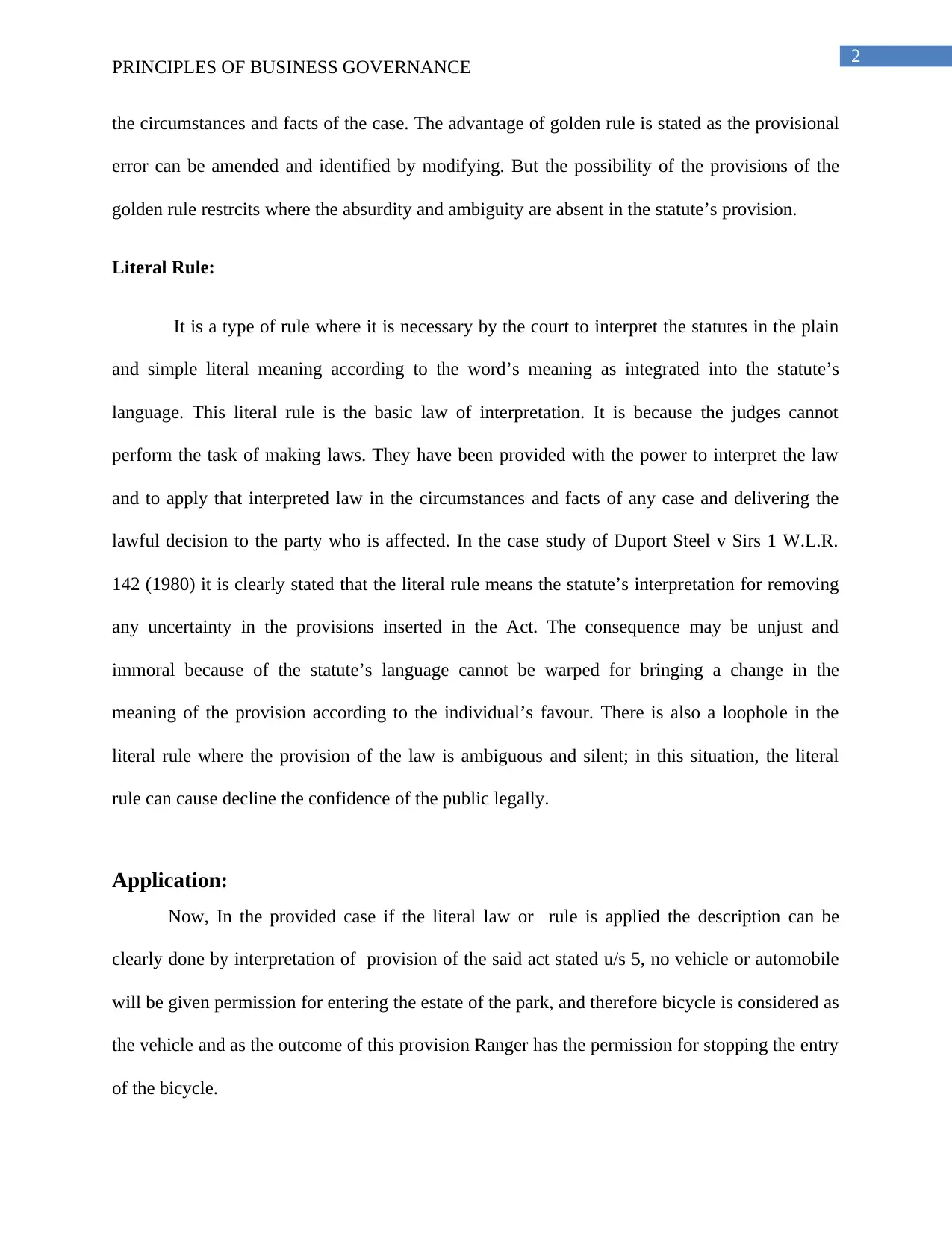
2
PRINCIPLES OF BUSINESS GOVERNANCE
the circumstances and facts of the case. The advantage of golden rule is stated as the provisional
error can be amended and identified by modifying. But the possibility of the provisions of the
golden rule restrcits where the absurdity and ambiguity are absent in the statute’s provision.
Literal Rule:
It is a type of rule where it is necessary by the court to interpret the statutes in the plain
and simple literal meaning according to the word’s meaning as integrated into the statute’s
language. This literal rule is the basic law of interpretation. It is because the judges cannot
perform the task of making laws. They have been provided with the power to interpret the law
and to apply that interpreted law in the circumstances and facts of any case and delivering the
lawful decision to the party who is affected. In the case study of Duport Steel v Sirs 1 W.L.R.
142 (1980) it is clearly stated that the literal rule means the statute’s interpretation for removing
any uncertainty in the provisions inserted in the Act. The consequence may be unjust and
immoral because of the statute’s language cannot be warped for bringing a change in the
meaning of the provision according to the individual’s favour. There is also a loophole in the
literal rule where the provision of the law is ambiguous and silent; in this situation, the literal
rule can cause decline the confidence of the public legally.
Application:
Now, In the provided case if the literal law or rule is applied the description can be
clearly done by interpretation of provision of the said act stated u/s 5, no vehicle or automobile
will be given permission for entering the estate of the park, and therefore bicycle is considered as
the vehicle and as the outcome of this provision Ranger has the permission for stopping the entry
of the bicycle.
PRINCIPLES OF BUSINESS GOVERNANCE
the circumstances and facts of the case. The advantage of golden rule is stated as the provisional
error can be amended and identified by modifying. But the possibility of the provisions of the
golden rule restrcits where the absurdity and ambiguity are absent in the statute’s provision.
Literal Rule:
It is a type of rule where it is necessary by the court to interpret the statutes in the plain
and simple literal meaning according to the word’s meaning as integrated into the statute’s
language. This literal rule is the basic law of interpretation. It is because the judges cannot
perform the task of making laws. They have been provided with the power to interpret the law
and to apply that interpreted law in the circumstances and facts of any case and delivering the
lawful decision to the party who is affected. In the case study of Duport Steel v Sirs 1 W.L.R.
142 (1980) it is clearly stated that the literal rule means the statute’s interpretation for removing
any uncertainty in the provisions inserted in the Act. The consequence may be unjust and
immoral because of the statute’s language cannot be warped for bringing a change in the
meaning of the provision according to the individual’s favour. There is also a loophole in the
literal rule where the provision of the law is ambiguous and silent; in this situation, the literal
rule can cause decline the confidence of the public legally.
Application:
Now, In the provided case if the literal law or rule is applied the description can be
clearly done by interpretation of provision of the said act stated u/s 5, no vehicle or automobile
will be given permission for entering the estate of the park, and therefore bicycle is considered as
the vehicle and as the outcome of this provision Ranger has the permission for stopping the entry
of the bicycle.
⊘ This is a preview!⊘
Do you want full access?
Subscribe today to unlock all pages.

Trusted by 1+ million students worldwide
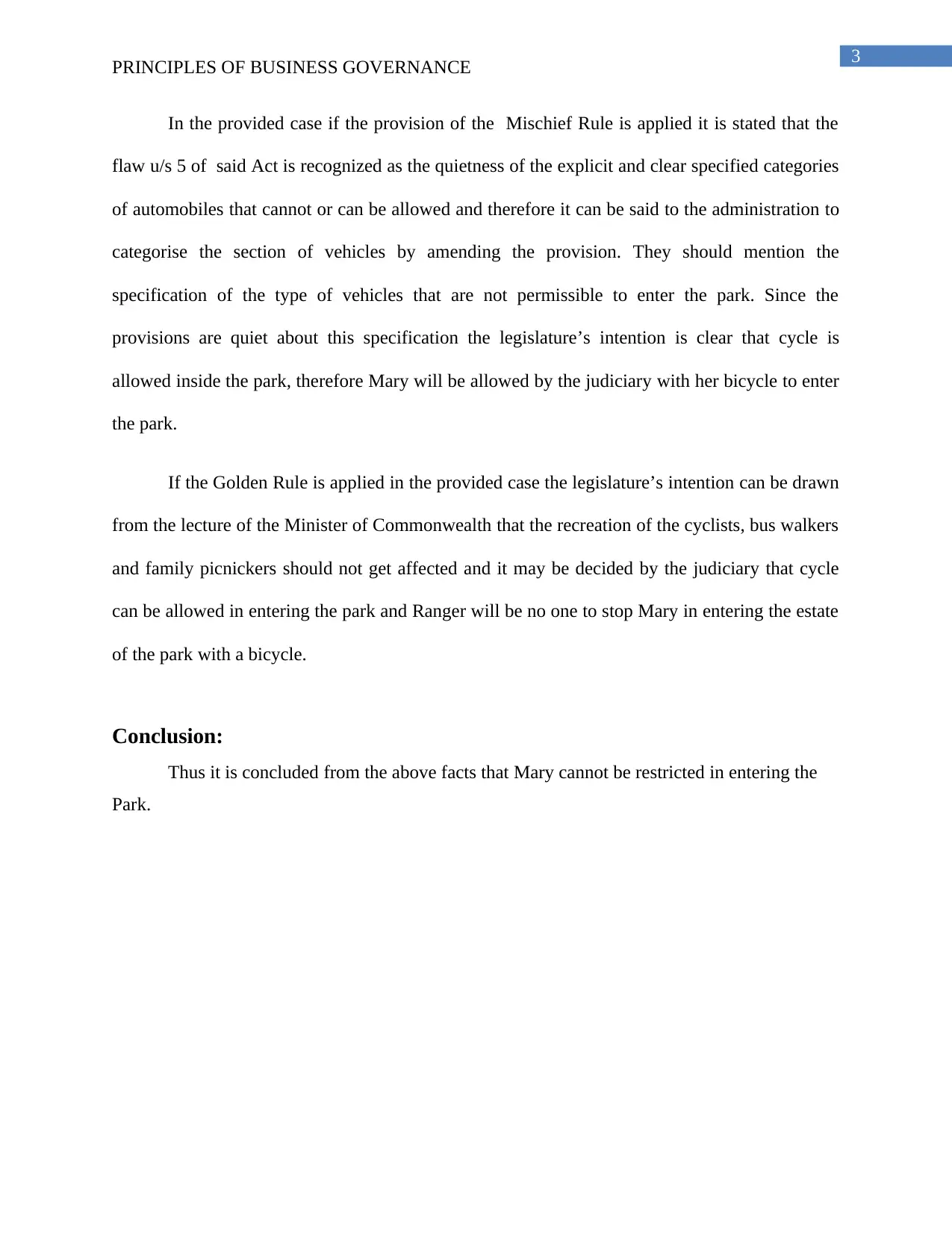
3
PRINCIPLES OF BUSINESS GOVERNANCE
In the provided case if the provision of the Mischief Rule is applied it is stated that the
flaw u/s 5 of said Act is recognized as the quietness of the explicit and clear specified categories
of automobiles that cannot or can be allowed and therefore it can be said to the administration to
categorise the section of vehicles by amending the provision. They should mention the
specification of the type of vehicles that are not permissible to enter the park. Since the
provisions are quiet about this specification the legislature’s intention is clear that cycle is
allowed inside the park, therefore Mary will be allowed by the judiciary with her bicycle to enter
the park.
If the Golden Rule is applied in the provided case the legislature’s intention can be drawn
from the lecture of the Minister of Commonwealth that the recreation of the cyclists, bus walkers
and family picnickers should not get affected and it may be decided by the judiciary that cycle
can be allowed in entering the park and Ranger will be no one to stop Mary in entering the estate
of the park with a bicycle.
Conclusion:
Thus it is concluded from the above facts that Mary cannot be restricted in entering the
Park.
PRINCIPLES OF BUSINESS GOVERNANCE
In the provided case if the provision of the Mischief Rule is applied it is stated that the
flaw u/s 5 of said Act is recognized as the quietness of the explicit and clear specified categories
of automobiles that cannot or can be allowed and therefore it can be said to the administration to
categorise the section of vehicles by amending the provision. They should mention the
specification of the type of vehicles that are not permissible to enter the park. Since the
provisions are quiet about this specification the legislature’s intention is clear that cycle is
allowed inside the park, therefore Mary will be allowed by the judiciary with her bicycle to enter
the park.
If the Golden Rule is applied in the provided case the legislature’s intention can be drawn
from the lecture of the Minister of Commonwealth that the recreation of the cyclists, bus walkers
and family picnickers should not get affected and it may be decided by the judiciary that cycle
can be allowed in entering the park and Ranger will be no one to stop Mary in entering the estate
of the park with a bicycle.
Conclusion:
Thus it is concluded from the above facts that Mary cannot be restricted in entering the
Park.
Paraphrase This Document
Need a fresh take? Get an instant paraphrase of this document with our AI Paraphraser
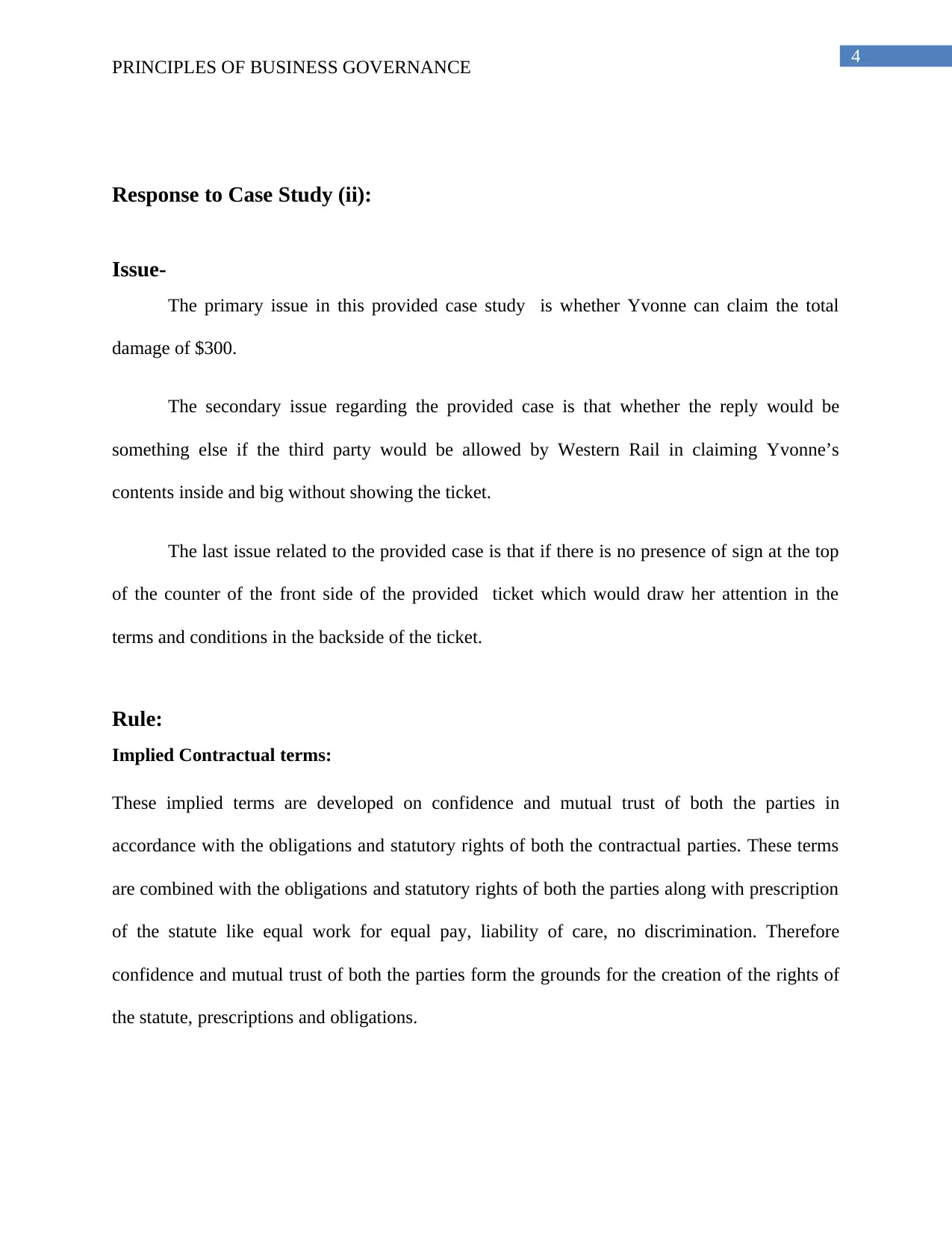
4
PRINCIPLES OF BUSINESS GOVERNANCE
Response to Case Study (ii):
Issue-
The primary issue in this provided case study is whether Yvonne can claim the total
damage of $300.
The secondary issue regarding the provided case is that whether the reply would be
something else if the third party would be allowed by Western Rail in claiming Yvonne’s
contents inside and big without showing the ticket.
The last issue related to the provided case is that if there is no presence of sign at the top
of the counter of the front side of the provided ticket which would draw her attention in the
terms and conditions in the backside of the ticket.
Rule:
Implied Contractual terms:
These implied terms are developed on confidence and mutual trust of both the parties in
accordance with the obligations and statutory rights of both the contractual parties. These terms
are combined with the obligations and statutory rights of both the parties along with prescription
of the statute like equal work for equal pay, liability of care, no discrimination. Therefore
confidence and mutual trust of both the parties form the grounds for the creation of the rights of
the statute, prescriptions and obligations.
PRINCIPLES OF BUSINESS GOVERNANCE
Response to Case Study (ii):
Issue-
The primary issue in this provided case study is whether Yvonne can claim the total
damage of $300.
The secondary issue regarding the provided case is that whether the reply would be
something else if the third party would be allowed by Western Rail in claiming Yvonne’s
contents inside and big without showing the ticket.
The last issue related to the provided case is that if there is no presence of sign at the top
of the counter of the front side of the provided ticket which would draw her attention in the
terms and conditions in the backside of the ticket.
Rule:
Implied Contractual terms:
These implied terms are developed on confidence and mutual trust of both the parties in
accordance with the obligations and statutory rights of both the contractual parties. These terms
are combined with the obligations and statutory rights of both the parties along with prescription
of the statute like equal work for equal pay, liability of care, no discrimination. Therefore
confidence and mutual trust of both the parties form the grounds for the creation of the rights of
the statute, prescriptions and obligations.
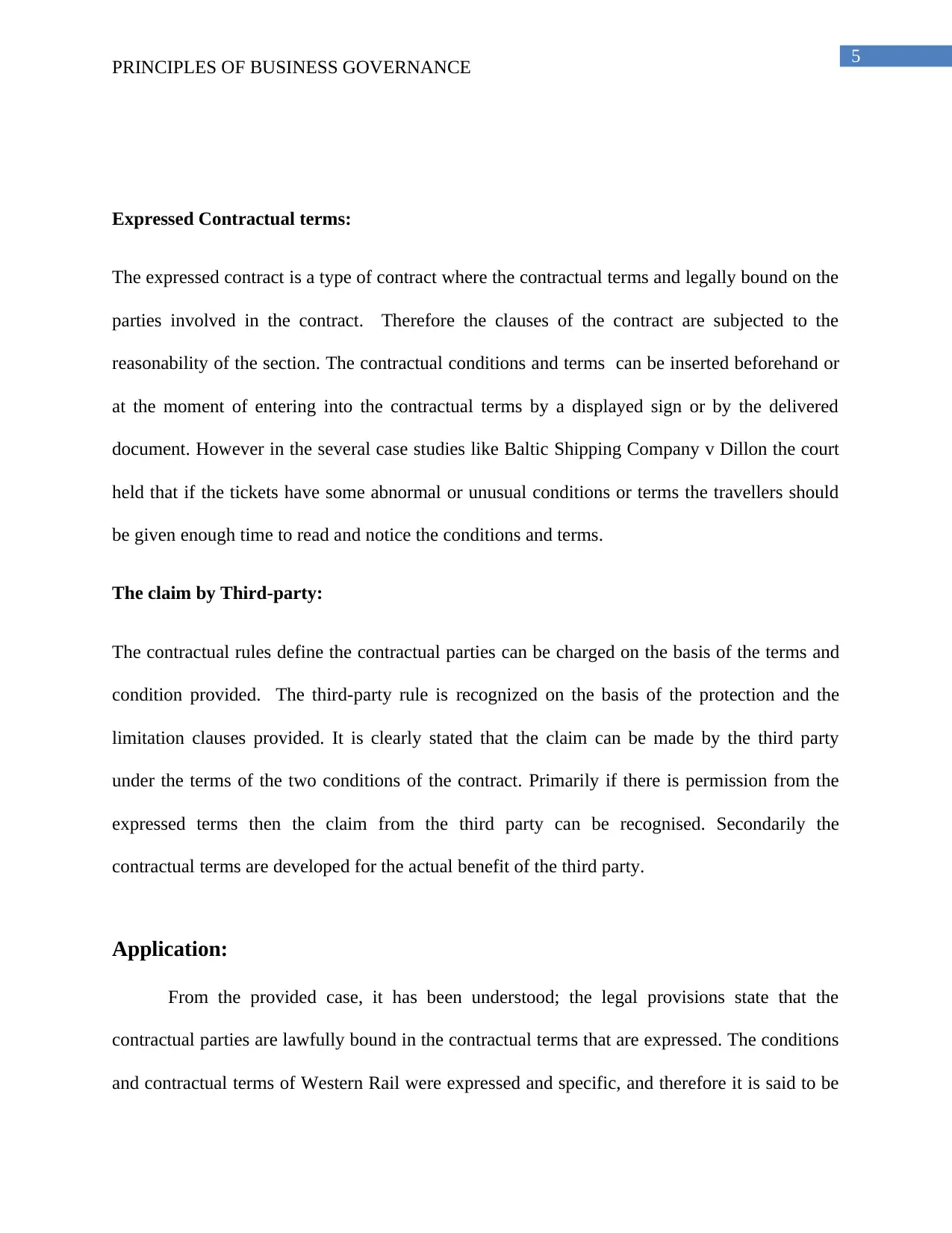
5
PRINCIPLES OF BUSINESS GOVERNANCE
Expressed Contractual terms:
The expressed contract is a type of contract where the contractual terms and legally bound on the
parties involved in the contract. Therefore the clauses of the contract are subjected to the
reasonability of the section. The contractual conditions and terms can be inserted beforehand or
at the moment of entering into the contractual terms by a displayed sign or by the delivered
document. However in the several case studies like Baltic Shipping Company v Dillon the court
held that if the tickets have some abnormal or unusual conditions or terms the travellers should
be given enough time to read and notice the conditions and terms.
The claim by Third-party:
The contractual rules define the contractual parties can be charged on the basis of the terms and
condition provided. The third-party rule is recognized on the basis of the protection and the
limitation clauses provided. It is clearly stated that the claim can be made by the third party
under the terms of the two conditions of the contract. Primarily if there is permission from the
expressed terms then the claim from the third party can be recognised. Secondarily the
contractual terms are developed for the actual benefit of the third party.
Application:
From the provided case, it has been understood; the legal provisions state that the
contractual parties are lawfully bound in the contractual terms that are expressed. The conditions
and contractual terms of Western Rail were expressed and specific, and therefore it is said to be
PRINCIPLES OF BUSINESS GOVERNANCE
Expressed Contractual terms:
The expressed contract is a type of contract where the contractual terms and legally bound on the
parties involved in the contract. Therefore the clauses of the contract are subjected to the
reasonability of the section. The contractual conditions and terms can be inserted beforehand or
at the moment of entering into the contractual terms by a displayed sign or by the delivered
document. However in the several case studies like Baltic Shipping Company v Dillon the court
held that if the tickets have some abnormal or unusual conditions or terms the travellers should
be given enough time to read and notice the conditions and terms.
The claim by Third-party:
The contractual rules define the contractual parties can be charged on the basis of the terms and
condition provided. The third-party rule is recognized on the basis of the protection and the
limitation clauses provided. It is clearly stated that the claim can be made by the third party
under the terms of the two conditions of the contract. Primarily if there is permission from the
expressed terms then the claim from the third party can be recognised. Secondarily the
contractual terms are developed for the actual benefit of the third party.
Application:
From the provided case, it has been understood; the legal provisions state that the
contractual parties are lawfully bound in the contractual terms that are expressed. The conditions
and contractual terms of Western Rail were expressed and specific, and therefore it is said to be
⊘ This is a preview!⊘
Do you want full access?
Subscribe today to unlock all pages.

Trusted by 1+ million students worldwide
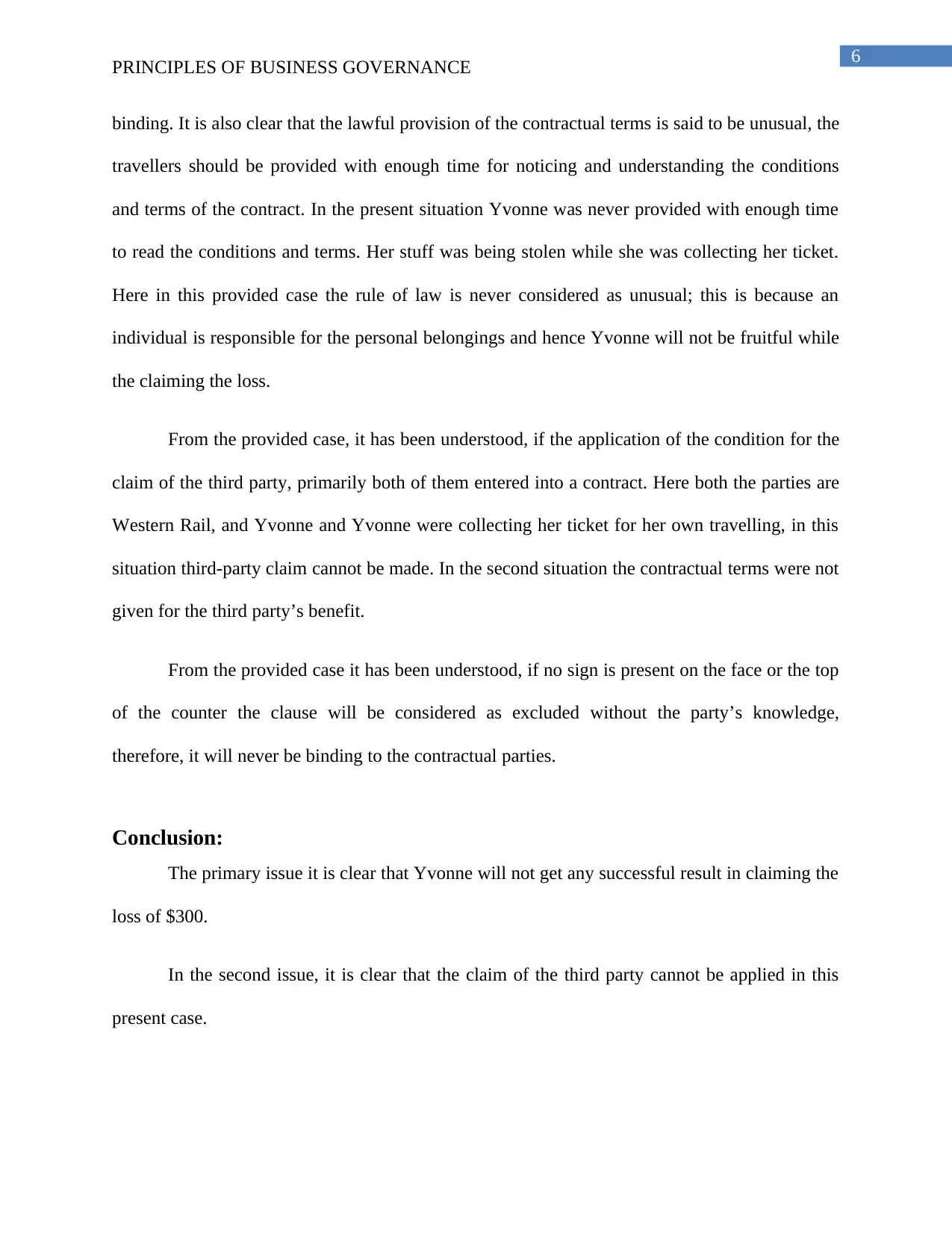
6
PRINCIPLES OF BUSINESS GOVERNANCE
binding. It is also clear that the lawful provision of the contractual terms is said to be unusual, the
travellers should be provided with enough time for noticing and understanding the conditions
and terms of the contract. In the present situation Yvonne was never provided with enough time
to read the conditions and terms. Her stuff was being stolen while she was collecting her ticket.
Here in this provided case the rule of law is never considered as unusual; this is because an
individual is responsible for the personal belongings and hence Yvonne will not be fruitful while
the claiming the loss.
From the provided case, it has been understood, if the application of the condition for the
claim of the third party, primarily both of them entered into a contract. Here both the parties are
Western Rail, and Yvonne and Yvonne were collecting her ticket for her own travelling, in this
situation third-party claim cannot be made. In the second situation the contractual terms were not
given for the third party’s benefit.
From the provided case it has been understood, if no sign is present on the face or the top
of the counter the clause will be considered as excluded without the party’s knowledge,
therefore, it will never be binding to the contractual parties.
Conclusion:
The primary issue it is clear that Yvonne will not get any successful result in claiming the
loss of $300.
In the second issue, it is clear that the claim of the third party cannot be applied in this
present case.
PRINCIPLES OF BUSINESS GOVERNANCE
binding. It is also clear that the lawful provision of the contractual terms is said to be unusual, the
travellers should be provided with enough time for noticing and understanding the conditions
and terms of the contract. In the present situation Yvonne was never provided with enough time
to read the conditions and terms. Her stuff was being stolen while she was collecting her ticket.
Here in this provided case the rule of law is never considered as unusual; this is because an
individual is responsible for the personal belongings and hence Yvonne will not be fruitful while
the claiming the loss.
From the provided case, it has been understood, if the application of the condition for the
claim of the third party, primarily both of them entered into a contract. Here both the parties are
Western Rail, and Yvonne and Yvonne were collecting her ticket for her own travelling, in this
situation third-party claim cannot be made. In the second situation the contractual terms were not
given for the third party’s benefit.
From the provided case it has been understood, if no sign is present on the face or the top
of the counter the clause will be considered as excluded without the party’s knowledge,
therefore, it will never be binding to the contractual parties.
Conclusion:
The primary issue it is clear that Yvonne will not get any successful result in claiming the
loss of $300.
In the second issue, it is clear that the claim of the third party cannot be applied in this
present case.
Paraphrase This Document
Need a fresh take? Get an instant paraphrase of this document with our AI Paraphraser

7
PRINCIPLES OF BUSINESS GOVERNANCE
In the last issue it is clear from the above mentioned facts that the conditions and the
contractual terms will never be considered as binding to contractual parties if there is not a
single presence of sign on the top of the ticket and at the top of the counter that will catch her
due attention than on the mentioned condition on the backside of the ticket.
PRINCIPLES OF BUSINESS GOVERNANCE
In the last issue it is clear from the above mentioned facts that the conditions and the
contractual terms will never be considered as binding to contractual parties if there is not a
single presence of sign on the top of the ticket and at the top of the counter that will catch her
due attention than on the mentioned condition on the backside of the ticket.
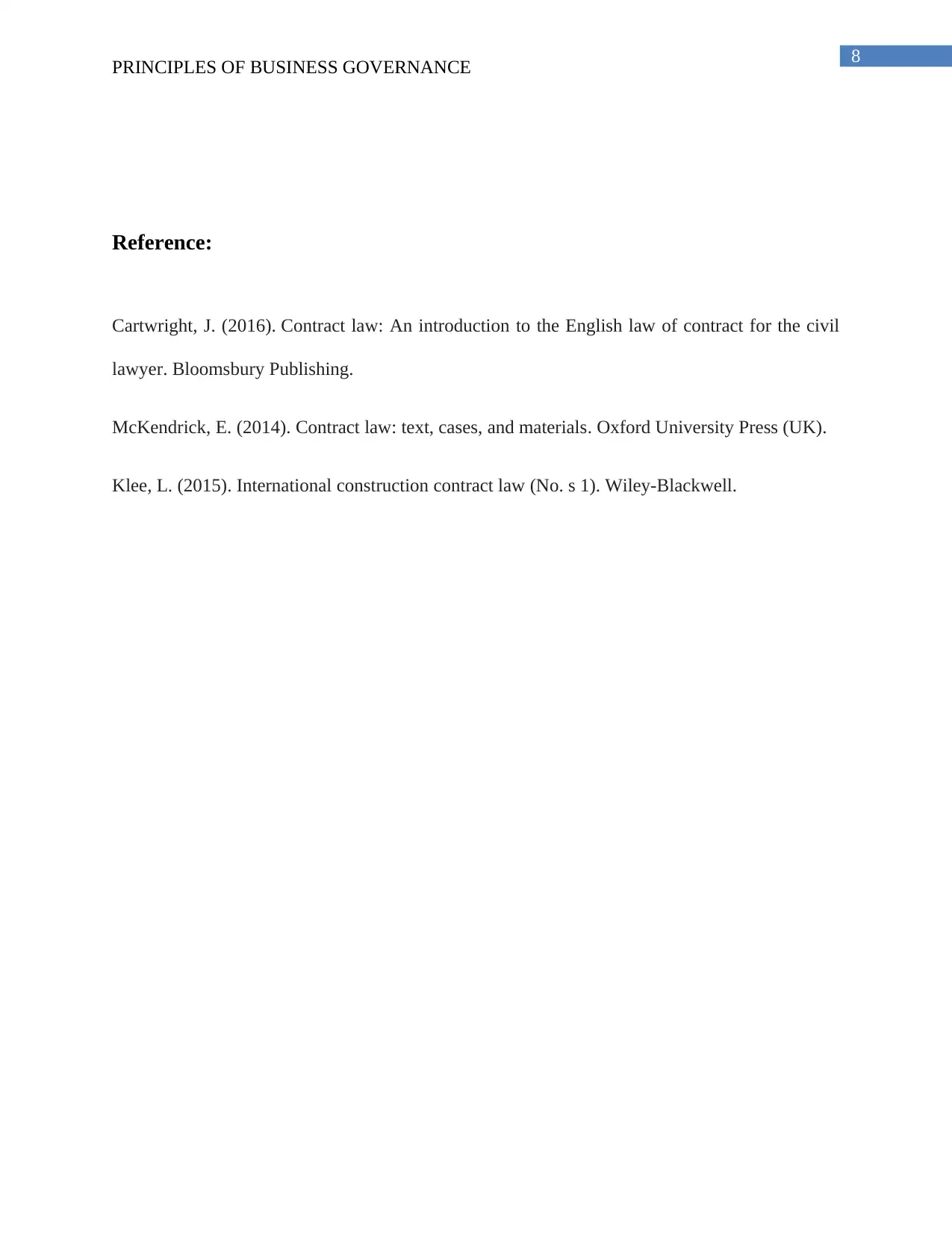
8
PRINCIPLES OF BUSINESS GOVERNANCE
Reference:
Cartwright, J. (2016). Contract law: An introduction to the English law of contract for the civil
lawyer. Bloomsbury Publishing.
McKendrick, E. (2014). Contract law: text, cases, and materials. Oxford University Press (UK).
Klee, L. (2015). International construction contract law (No. s 1). Wiley-Blackwell.
PRINCIPLES OF BUSINESS GOVERNANCE
Reference:
Cartwright, J. (2016). Contract law: An introduction to the English law of contract for the civil
lawyer. Bloomsbury Publishing.
McKendrick, E. (2014). Contract law: text, cases, and materials. Oxford University Press (UK).
Klee, L. (2015). International construction contract law (No. s 1). Wiley-Blackwell.
⊘ This is a preview!⊘
Do you want full access?
Subscribe today to unlock all pages.

Trusted by 1+ million students worldwide

9
PRINCIPLES OF BUSINESS GOVERNANCE
PRINCIPLES OF BUSINESS GOVERNANCE
Paraphrase This Document
Need a fresh take? Get an instant paraphrase of this document with our AI Paraphraser

10
PRINCIPLES OF BUSINESS GOVERNANCE
PRINCIPLES OF BUSINESS GOVERNANCE
1 out of 11
Related Documents
Your All-in-One AI-Powered Toolkit for Academic Success.
+13062052269
info@desklib.com
Available 24*7 on WhatsApp / Email
![[object Object]](/_next/static/media/star-bottom.7253800d.svg)
Unlock your academic potential
Copyright © 2020–2025 A2Z Services. All Rights Reserved. Developed and managed by ZUCOL.





